FEDERAL
MANAGEMENT REFORM
IN A WORLD OF
CONTRADICTIONS
PUBLIC MANAGEMENT AND CHANGE SERIES
Beryl A. Radin, Series Editor
Editorial Board
Robert Agranoff
Michael Barzelay
Ann OM. Bowman
H. George Frederickson
William Gormley
Rosemary OLeary
Norma Riccucci
David H. Rosenbloom
Titles in the Series
Challenging the Performance Movement: Accountability, Complexity, and Democratic Values, BERYL A. RADIN
Charitable Choice at Work: Evaluating Faith-Based Job Programs in the States, SHEILA SUESS KENNEDY AND WOLFGANG BIELEFELD
The Collaborative Public Manager: New Ideas for the Twenty-First Century, ROSEMARY OLEARY AND LISA BLOMGREN BINGHAM, EDITORS
The Dynamics of Performance Management: Constructing Information and Reform, DONALD P. MOYNIHAN
The Future of Public Administration around the World: The Minnowbrook Perspective, ROSEMARY OLEARY, DAVID VAN SLYKE, AND SOONHEE KIM, EDITORS
The Greening of the U.S. Military: Environmental Policy, National Security, and Organizational Change, ROBERT F. DURANT
High-Stakes Reform: The Politics of Educational Accountability, KATHRYN A. MCDERMOTT
How Management Matters: Street-Level Bureaucrats and Welfare Reform, NORMA M. RICCUCCI
Implementing Innovation: Fostering Enduring Change in Environmental and Natural Resource Governance, TODDI A. STEELMAN
Managing within Networks: Adding Value to Public Organizations, ROBERT AGRANOFF
Measuring the Performance of the Hollow State, DAVID G. FREDERICKSON AND H. GEORGE FREDERICKSON
Organizational Learning at NASA: The Challenger and Columbia Accidents, JULIANNE G. MAHLER WITH MAUREEN HOGAN CASAMAYOU
Program Budgeting and the Performance Movement: The Elusive Quest for Efficiency in Government, WILLIAM F. WEST
Public Administration: Traditions of Inquiry and Philosophies of Knowledge, NORMA M. RICCUCCI
Public Values and Public Interest: Counterbalancing Economic Individualism, BARRY BOZEMAN
The Responsible Contract Manager: Protecting the Public Interest in an Outsourced World, STEVEN COHEN AND WILLIAM EIMICKE
Revisiting Waldos Administrative State: Constancy and Change in Public Administration, DAVID H. ROSENBLOOM AND HOWARD E. MCCURDY
FEDERAL
MANAGEMENT REFORM
IN A WORLD OF
CONTRADICTIONS
Beryl A. Radin
Georgetown University Press, Washington, D.C. www.press.georgetown.edu
2012 by Georgetown University Press. All rights reserved. No part of this book may be reproduced or utilized in any form or by any means, electronic or mechanical, including photocopying and recording, or by any information storage and retrieval system, without permission in writing from the publisher.
Library of Congress Cataloging-in-Publication Data
Radin, Beryl.
Federal management reform in a world of contradictions / Beryl A. Radin.
p. cm.(Public management and change series)
Includes bibliographical references and index.
ISBN 978-1-58901-892-1 (pbk. : alk. paper)
1. Civil service reformUnited States. 2. Public administrationUnited States. 3. Administrative agenciesUnited StatesManagement. I. Title.
JK692.R33 2012
352.3 670973dc23 2011036097

This book is printed on acid-free paper meeting the requirements of the American National Standard for Permanence in Paper for Printed Library Materials.
15 14 13 12 9 8 7 6 5 4 3 2 First printing
Printed in the United States of America
CONTENTS
LIST OF FIGURES AND TABLES
Figures
Tables
PREFACE
FOR MOST AUTHORS THE PROCESS OF WRITING A BOOK PROVIDES AN INTEResting story. But this book had unusual origins and a path that was often bittersweet.
The idea for this work began in synagogue on Yom Kippur 2009. One of the congregation members gave what is called the drashsomething like a sermon that is meant to provide the congregants with ideas that put the ritual in an inspirational framework.
Thus I heard Dennis Kirschbaum talk about one of his favorite films, Groundhog Day, and suggest the message that it provided was relevant to the Day of Atonement. He noted, Yom Kippur represents an opportunity, a unique space in time when, if we do what we need to do, we can go forward into this new year and be different. He quoted Rabbi Sharon Brous, who writes that the reason we choose not to change, is because we believe that we are already finished. That who we are now is who we must be. That we are so entrenched that there is no way to start anew.
This was an unusual challenge. At first I responded to it as an individual, thinking about family, friends, and personal issues. But then I began to think about this message as a call to think about the world of federal management reformthe topic that has largely preoccupied me over forty years as a scholar and sometimes practitioner.
As I thought about the range of reforms that I had studied over the yearsreorganization, performance measurement, budgeting, personnel, federalism, and contracting outI had the sense that my colleagues and the public management community were trapped in a dynamic very much like that experienced by the hero of the movie. We seemed to be repeating the same behavior and the same prescriptions time and time again and yet very little changed. Our goals were commendable but our means did not accomplish those goals.
I was sitting in the synagogue with one of my closest and longtime friends, Carla Cohen, the founder of the incredible Washington bookstore, Politics and Prose. We were both struck by Kirschbaums remarks and they became the basis for conversations that lasted over a year and often involved Carlas husband, David.
But as the months progressed and the book took form in my mind, Carla had to deal with a rare form of cancer that eventually overpowered her in October 2010. She received the diagnosis of bile duct cancer in November. It was only in the last month or so of her life that she was unable to engage in the energetic exchange of ideas that so characterized her incredibly vital life. Soon after she died my writing was interrupted by my own health scare.
Thus this book is dedicated to Carla Furstenberg Cohen. I had looked forward to launching the book at Politics and Prose with Carla at the helm (like I had done with four other books). Perhaps that launch will occur. But it will not be the same without her.
During the development of this argument I received advice from a number of colleagues and friends. These included Robert Agranoff, Susannah Ali, Howell Baum, Ann Bowman, David Cohen, George Frederickson, John Hart, Stephanie Newbold, Paul Posner, Norma Riccucci, Colin Talbot, John Uhr, Bill West, and several anonymous reviewers. And I continue to appreciate the advice of Don Jacobs of Georgetown University Press.

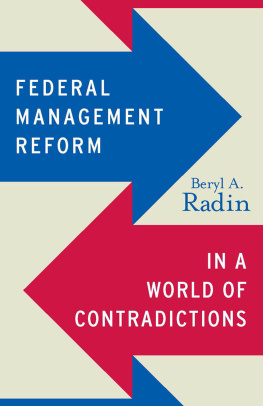
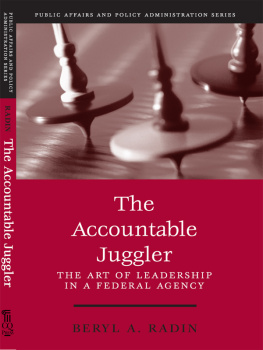
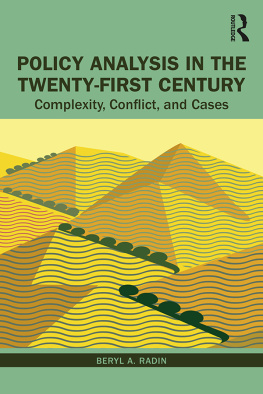
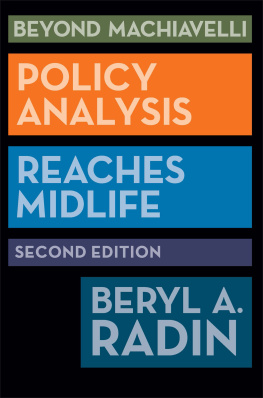

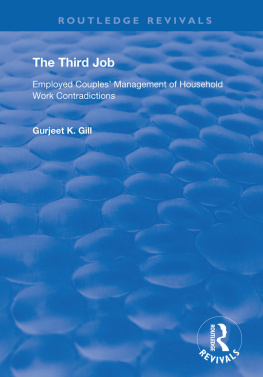
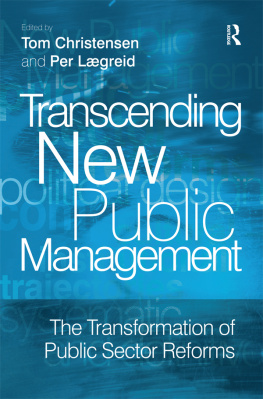

 This book is printed on acid-free paper meeting the requirements of the American National Standard for Permanence in Paper for Printed Library Materials.
This book is printed on acid-free paper meeting the requirements of the American National Standard for Permanence in Paper for Printed Library Materials.